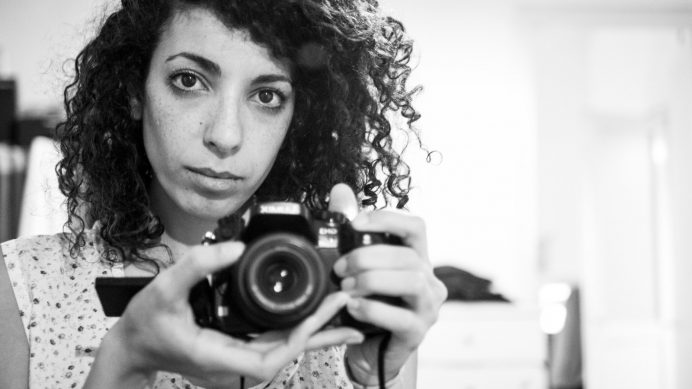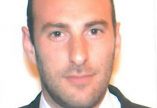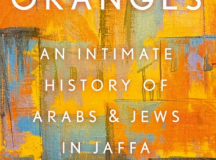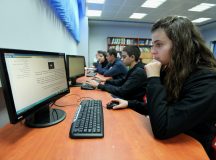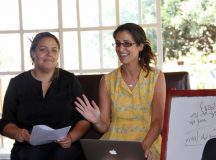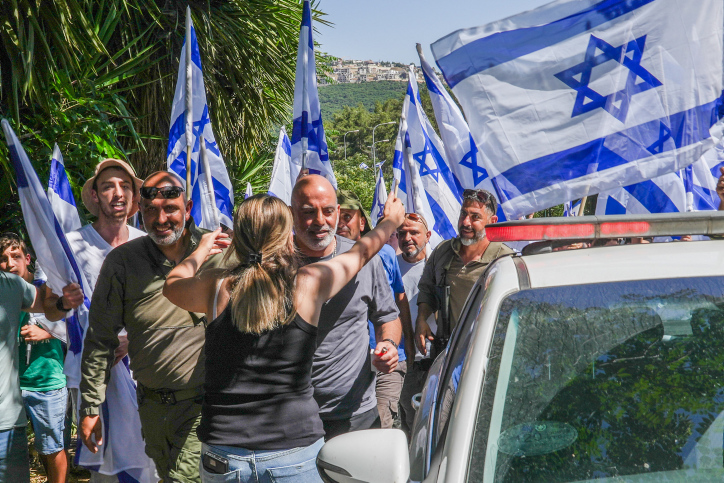Rana Abu Fraiha was born in the Bedouin town of Tel Sheva before leaving with her family at age five to the nearby Jewish and patriotic town of Omer. In this conversation with Fathom Deputy Editor Calev Ben-Dor she discusses her acclaimed documentary In Her Footsteps about her parents’ dream of integrating into the Jewish Israel mainstream, and the challenging consequences that decision had on their children.
Tolstoy famously wrote that ‘All happy families resemble one another, but each unhappy family is unhappy in its own way.’ The Abu Fraiha family – the subject of a beautiful and moving documentary In Her Footsteps produced by Rana Abu Fraiha – is far from unhappy. Yet they are unique.
Rana’s mother Rodaina and father Aoudeh were both educated professionals. Her father studied at the Haifa Institute of Technology and became the first Bedouin engineer in Israel. Her mother grew up in Jatt in Northern Israel and left home at 14 to receive a European education at a convent, ‘when all the other local girls were picking vegetables or cleaning homes with their mothers’, as she recounts. She subsequently worked as an English teacher in the Negev Bedouin town of Tel Sheva, where Rana’s father had grown up and where the family first settled. But Rodaina – who wants her family (especially her daughters) to gain a ‘better education’, pushes for the family to move to the nearby upscale Jewish town of Omer. They leave in the middle of the night when Rana is five years old.
Dancing in the middle
In Her Footsteps (trailer here) is a story on different levels. It’s about a mother struggling with terminal cancer and how it affects the family before and after she passes away; it’s about a dream to integrate into the Jewish Israel mainstream that is fulfilled, but only to an extent; and it’s about children living with the consequences of their parents’ decisions, who feel ‘neither here nor there but dancing in the middle’ as Aoudeh comments, or as Rana’s sister Samar says means ‘you have no family, you have no background you have no roots.’
The film won the best director of a documentary award at the 2017 Jerusalem film festival and in April 2021, the New Israel Fund chose Rana was one of 14 recipients of the Essential Art grants. When I met her in a quiet artsy-Bohemian Jerusalem café along the old railway line that ran from Jerusalem to Jaffa, Rana explained that she recently began teaching and mentoring in Sapir College in Sderot and Bezalel Academy of Art and Design in Jerusalem. She runs workshops for both Jewish and Arab groups based on social-political discourse ‘The film opens something within each person’ Rana explains. ‘Even for those people who are upset with it or get defensive. But something about the family touches each person in a different place.’
The question of identity
Novelist and TV producer Sayed Kashua once argued that the question of identity faced by Palestinians carrying Israeli citizenship is far from simple and does not ‘boil down to a matter of choosing between self and other, authentic or false.’ Mahmoud Darwish, considered the national Palestinian poet, wrote that it was impossible to ignore the place of the “Israeli” in his identity. ‘Israelis have changed the Palestinians and vice versa. Israelis are not the same as they were when they came, and the Palestinians are not the same people either. Each dwells inside the other’ he wrote. ‘The other is a responsibility and a test…Will a third emerge out of the two? This is the test.’
Indeed, these questions of identity, authenticity and whether the Abu Fraiha’s have forged something new underlie many aspects of In Her Footsteps.
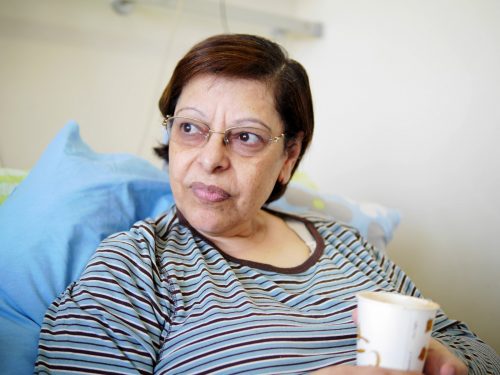 Rodaina Fraiha, courtesy of author.
Rodaina Fraiha, courtesy of author.
Such questions over national self-definition will inevitably follow Rana. In our conversation she rails against the discrimination in Israel and the establishment’s ‘fear to give the Arab minority the place it should have.’ But she’s also not convinced that these definitions need to be front and centre and uses her mother as inspiration. ‘The question of identity and definition is often important to people. People want us to choose one specific identity, but my mother didn’t want to. In fact, the time she was most precise about what she wanted to say was when death was approaching – the most important identity was that she was a mother to her daughters and prioritised how she could use her time here to draw us a path to walk on’.
‘I searched for a specific slot for a very long time’ Rana says, ‘and I questioned whether I could call myself Palestinian, or Bedouin or Israeli’. But the documentary also seeks to take viewers away from those national identities towards something else. ‘Nationality is important, but it isn’t supposed to limit me,’ argues Rana. ‘I always search for the common ground we can share, and the movie does that – you stop thinking about Bedouins and Arabs and Jews and enter a family story – a family separating from a mother. Each day I wake up to a world in which my mother isn’t physically here, and this identity – of having lost my mother – is much more powerful on a daily basis.’
Yet national identity and the confusion of an Arab family growing up in Omer cannot be completely ignored. One overriding issue throughout the documentary is whether Rodaina – a resident of Omer for over two decades – will be able to be buried in the town’s (Jewish) cemetery. In another scene, we see the young Rana and her siblings waving Israeli flags and singing old Zionist songs as Rodaina looks on. When she speaks to audiences, Rana describes Omer as one of the most Zionistic, patriotic, Ashkenazi places in the country.
‘The scene when we sing Israeli songs as kids can be viewed through a political prism such as the repression of identity. But today I also see how my mother is laughing and is a bit embarrassed by it all. It doesn’t fit with the choices she thought she was making in moving to Omer’. Indeed, the parents’ choice to move to a homogenous Jewish town – and to speak Hebrew at home – has all sorts of consequences for the children. In one scene, Rana angrily tells her father, ‘We didn’t grow up as Arabs, Dad’. Thoughtful and reflective, her father is willing to admit that ‘cutting you off from Arab society was a mistake.’
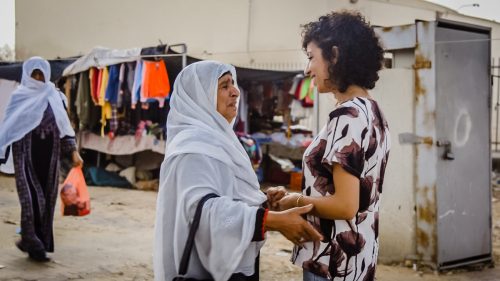 Rana Abu Fraiha right, courtesy of author.
Rana Abu Fraiha right, courtesy of author.
In our conversation, Rana recounts that ‘speaking Hebrew was to a certain extent an expression of negating our culture and identity. Every day I feel that loss of not speaking Arabic’. Yet she is also somewhat forgiving, aware that her and her siblings are the product of a brave and courageous decision made by their parents. ‘Each of my parents did something new that people hadn’t done before. We the children were each born within that newness, we couldn’t go back. It’s difficult – but that doesn’t necessarily mean it’s good or bad – just that its difficult.’
Everything you want and everything you don’t want
After announcing the Essential Art prize winners, the New Israel Fund introduced each artist through the voice of another one of the winners. When Rana is described by Ethiopian Israeli artist Orit Tashoma, she is termed ‘a filmmaker, a feminist, an Israeli, a Bedouin, a Palestinian. She’s everything you want and everything you don’t want in one brave woman.’ Rana is happy to embrace these many (and sometimes competing) identities, adding that such experiences aren’t so unique. ‘The lesson humanity is currently learning is how to live within the duality. There are so many different groups that don’t agree but who live here together – in relationships that experience significant tensions. Corona and having to stay at home added a further component – how family units can survive where there are opposites, when family members see things very differently … to be together within the opposites. Families, groups, societies all share similarities, just on a different scale.’
Linking the disparate components
In one conversation in the documentary Rana curiously asks Rodaina who she thinks Rana will marry – in other words, how someone with her set of life experiences will manage to find a spouse. ‘Someone who has similar experiences to you’, Rodaina pronounces. ‘That doesn’t exist’ Rana responds.
Half a decade on, Rana understands this conversation differently. ‘Someone like me could be anyone who understands what it means to live within many different identities, who has been on a journey along the margins.’ Rana says. ‘I am not lonely, but I do find myself on the periphery of many groups.’
Before her death, Rodaina’s wish is that her children manage to connect all the different components of their background. ‘The mentality of Tel Sheva, and the Jewish mentality and the northern mentality – I hope you’ll continue walking in our path,’ she says. To what extent does Rana feel she is fulfilling this wish? In response, Rana relates a scene from early in the documentary, when she visits Tel Sheva and serendipitously meets a group of older women. After one has pointedly asked Rana if she’s married and subsequently wonders whether she would consider marrying one of her cousins, another lady remembers her mother as a teacher and excitedly relates how Rodaina would encourage her daughter to learn English and proudly explains that she is now a social worker who writes reports for court.
‘After that meeting’ Rana relates ‘I understood that my mother could be both angry and critical of Bedouin society while at the same time putting her heart and lots of energy into teaching within it. My mother was an example of how to live opposites – as a girl that was very difficult and confusing. And the beginning of the film there is anger at that. But today I understand this better – how to live a duality and how these things don’t need to clash.’
In the film’s last scene, after her mother has passed away, Rana is walking in the Moroccan desert with her father. Ambling ahead of her, carefully walking along the large dunes of sand, he warns her not to go too close to the edge ‘so you don’t slip’. ‘But’, he adds ‘to walk where no one has walked before, that’s also difficult.’

